|
It moves mountains
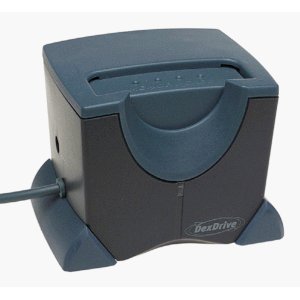
Introduction
Ever since home video games became advanced enough to require several hours to complete, a way to save progress and continue playing later has been a popular idea. Most systems as early as the NES and various home computers offered passwords or file saving right on the media the game was kept on. Yet, for cartridges that could store save files, there was no option to keep additional backups of your progress, in the event something terrible was to happen.
That all changed with the Nintendo 64, along with the PlayStation. For one thing, both of these consoles used memory cards to hold save files, still a relatively new idea back then. Not only that, the average home computer had Windows 95, a relatively powerful operating system of the period. It was here that an accessory by InterAct would give consumers a solution to their seemingly ephemeral save files. The DexDrive it was called, a device one could plug their N64 Controller Paks into, released in late 1998.
The DexDrive is a small adapter that is used on IBM Compatible PCs, to allow players to copy, restore, backup and share save files on N64 Controller Paks, or memory cards as they're known to PlayStation owners. It offered a lot of potential in the heyday of the N64 and was totally legal. Back then, the internet was gaining more and more popularity among average people, the idea of trading your saves with other people around the world and downloading completed save files was an amazing idea, which is still popular to this day on newer consoles.
What Comes in the Box
The DexDrive was certainly a product of its time. Inside the original box you'd find the DexDrive adapter itself, with its own serial cable permanently attached, an AC adapter, two floppy disks containing the DexPlorer software, an instruction booklet, a registration card and an InterAct advertisement booklet. The overall package is nice, nothing overly cheap feeling. The advertisement book is an amusing look into the past at this point, certainly worth a flip through to get you in the mood for some contemporary N64.
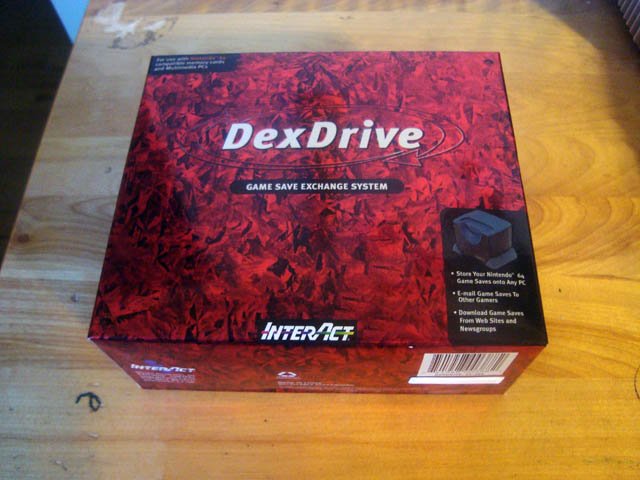
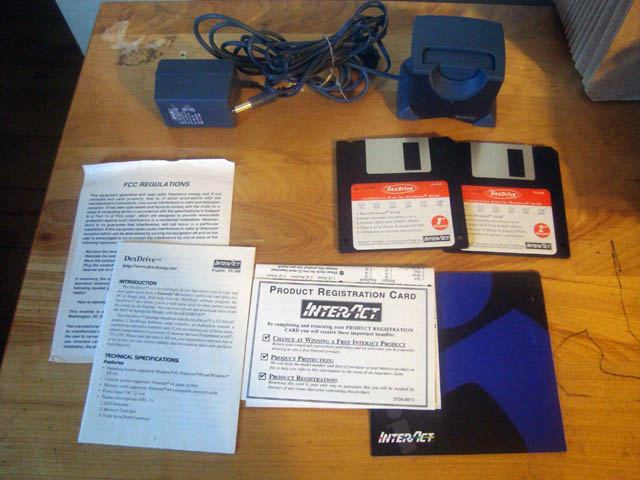
How to Install
It's been over 10 years since the DexDrive was released, today it can be very problematic to use if you have kept up with modern innovations with the IBM Compatible PC of old, now simply known as the PC. In 1999, nearly everyone had a computer capable of working with the DexDrive. Today is a different story all together. The DexDrive's software, DexPlorer, is almost completely obsolete.
First we will explain installation in the traditional sense. All you need is a 100% IBM Compatible PC with a serial port (COM1), a floppy drive, a VGA monitor capable of resolutions in excess of 800x600 and an available power outlet for the DexDrive's AC adapter. To install the software, all you do is put Disk 1 into the floppy drive, locate the drive in Windows Explorer and double click on Setup. The installer software will ask for Disk 2 at some point.
If you live in the 21st century however, this is where things become very difficult. You see, desktop and laptop PCs haven't had serial ports in many years, nor a floppy drive. Most can do resolutions many times bigger than 800x600. While serial adapters can be used and the software can be downloaded on this page, the biggest hurdle is trying to get DexPlorer to work on anything newer than Windows ME. You see, DexPlorer is a 16-bit Windows program, technically making it a Windows 3.1-level program. Only Windows 95, 98 and ME have enough support for 16-bit legacy programs to make DexPlorer work. Windows 2000, XP, Vista, 7, 8 and anything else in between have little to no 16-bit support and will not work with DexPlorer.
There is a solution however; all you need is Virtual PC 2007 and a copy of Windows 95, 98 or ME. Follow the instructions included with Virtual PC to understand how to set up a virtualized Windows 98 PC on your modern machine. Although performance won't be as good as a dedicated PC, DexPlorer barely takes any CPU power to work, so virtualization will be fine here. While Virtual PC 2007 works well on XP and Vista, it is blocked on Windows 7, instead replaced with XP Mode. If you have Windows 7, you'll need an alternative like Virtual Box or VMWare to set up a Windows 9x Virtual Machine. Links for both Virtual PC 2007 and Virtual Box can be found at the bottom of this article. If you need detailed instructions for setting up either program, there are many good video tutorials on YouTube.
NOTE: We at Micro-64 urge you to use the included AC adapter. Although the instructions state this is only needed if using a third party Controller Pak or if the card has multiple sections of pages, you should use the AC adapter anyway. The serial port doesn't offer much power and Controller Paks can become sketchy with age. By using the AC adapter, you protect your data against errors due to insufficient power.
Using DexPlorer
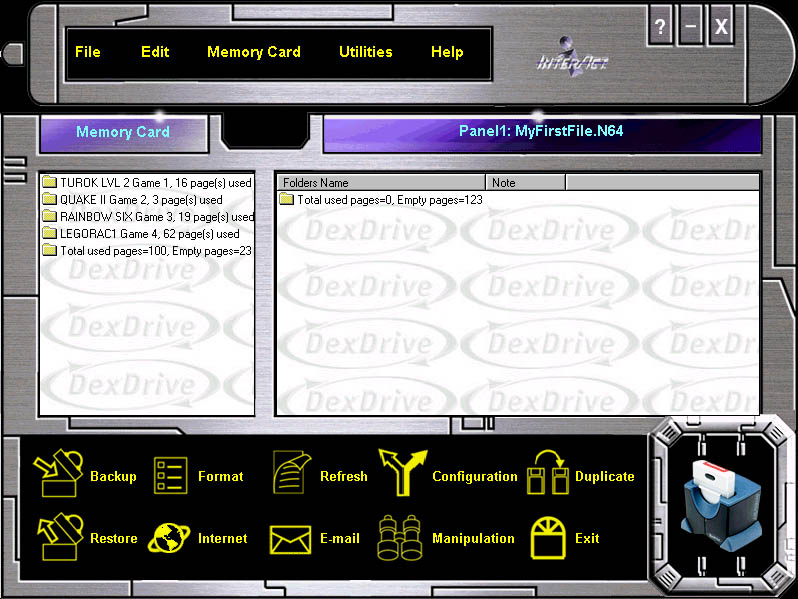 Assuming you have the DexDrive all set up and DexPlorer is working, you will be able to unlock the full potential of your N64 Controller Paks in no time flat. Here we will go over the various functions of DexPlorer.
Assuming you have the DexDrive all set up and DexPlorer is working, you will be able to unlock the full potential of your N64 Controller Paks in no time flat. Here we will go over the various functions of DexPlorer.
There were two versions of DexPlorer. The one most users are familiar with is Version 1.10.950, which was included with most retail copies of the DexDrive. The interface is simple but easy to read and very usable. Then there's Version 2.00, released a year later. InterAct felt the need to add ugly graphics and an overly complicated layout of information. I recommend the earlier version, but feel free to use whichever version you like better. Both of them can be downloaded at the bottom of this article, under Links.
DexPlorer handles save files by loading an inserted Controller Pak on the left side of the program window, while showing a database file on the right. When you want to backup a memory card, DexPlorer will want you to name a database file for the memory card. Backing up data in this way will produce a file which is essentially a virtual memory card, with multiple save files stored. It's possible to save individual files for sharing however.
NOTE: DexPlorer uses .n64 for memory card files. Some N64 ROM files also use the .n64 file extension, but they're not the same and shouldn't be confused.
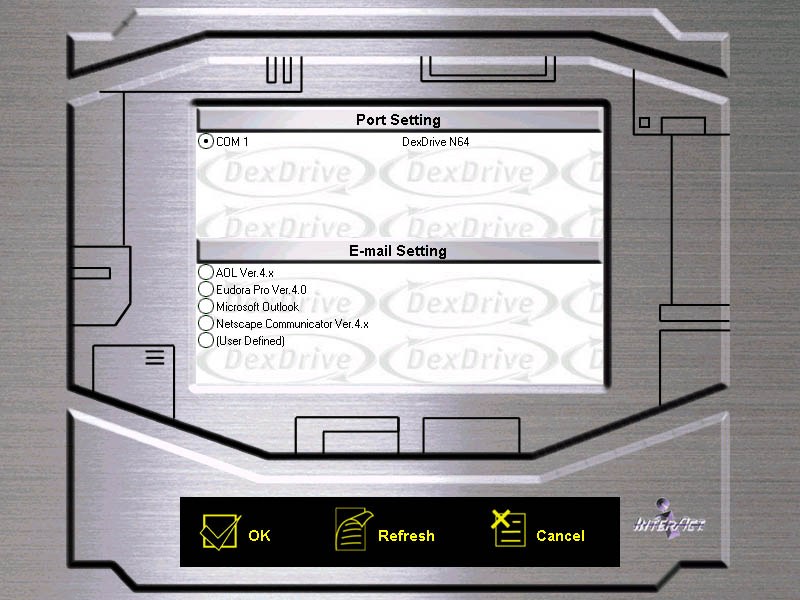
Beyond the basic backup and restore functions, there isn't much else to mention. You can format a Controller Pak, adjust DexPlorer configurations, copy and delete individual files and more easily sort your save files with the basic Controller Pak manager screen included with some N64 games.
Interestingly, the DexPlorer software offers email integration to allow easier sharing of files. Of course, nearly all the pre-defined options are obsolete today. Back then however, this was really quite convenient if you simply wanted to share files with email friends.
There's a couple of extra converter tools available as well, not made by InterAct. The first is a program called Mempack Save Converter. It allows you to convert N64 DexDrive save files to Z64 format saves and in reverse. The other utility similarly converts formats; here it can convert EEPROM save files from Dexchange.net into V64 format saves. These tools are only really useful for emulators, copier devices and the Everdrive 64. All you need is DexPlorer if you intend to do your file sharing exclusively through it. You can find links to these utilities at the bottom of this article, under Links.
Dexchange.net
The official website for the DexDrive, Dexchange.net, was a very notable extension of the adapter itself. Here, owners of the DexDrive could trade their save files with other people around the world. I would love to mention further details about this site, but unfortunately, it was closed around 2001 and not even archive.org has kept very good records of the site. The domain name has since been bought and sold many times over.
Copying On-cart Save Files
Although this isn't strictly a DexDrive feature, it's worth mentioning. Most N64 games use the controller pak for saving, thus the DexDrive is compatible with many games. However, there are quite a few titles (mostly popular ones) that only save on the cartridge itself. With just a DexDrive, these cartridges are not compatible. Luckily, InterAct included a solution to this in their Gameshark accessory. Normally it's used for hacking games, but it features the ability to copy internal cartridge saves to a controller pak. This is located in the options menu on the Gameshark. While the controller pak always contains Static RAM, cartridges use various different types of memory, such as EEPROM and FlashRAM, as well as SRAM. Normally EEPROM and SRAM games are capable of being backed up to controller pak, FlashRAM used in games is too big to fit on a single controller pak. More information on which games use what save method can be found on this page
NOTE: When backing up a cartridge with SRAM to a controller pak, try to always use an empty pak, or the file transfer may become corrupted.
Frequently Asked Questions
Q: Where can I buy a DexDrive?
A: Ebay. Or Amazon. These things were overprinted so you can easily get a brand new one for around $20.
Q: Is the AC Adaptor required to use DexDrive?
A: InterAct says only for third party memory cards and any that have multiple sections, but Micro-64 recommends using it for all memory cards.
Q: Do my N64, TV, DexDrive, and PC all need to be in the same room?
A: Nope. Just take your memory card out of the back of your N64 controller and bring it to where you keep your DexDrive and PC.
Q: Is it really worth backing up saves?
A: You'll never know until it's too late. If the battery ever dies in your memory card, then all your saves are gone. If you spend such a long time playing a game, you might as well back it up.
Q: Will game saves work in any region?
A: USA, PAL, and JPN save files can all be saved and used on the same memory card. Region shouldn't matter at all. Now there could possibly be a game out there where it does matter, but we haven't found any yet.
Q: Are these called controller paks or memory cards?
A: They're official known as controller paks, but third party companies and most people call it a memory card, or memory pak.
Q: How do you access the memory card manager on your N64?
A: It depends on the game. If the game uses a memory card, then holding start while you turn the power on should let you access it. The Gameshark also has a memory card manager.
Q: Does the DexDrive support all brands of memory cards?
A: It should. To be safe you can always use an official or InterAct branded memory pak.
Q: How much space is on a Nintendo 64 memory card?
A: A standard memory card holds 123 pages and 16 notes.
Q: What's with all these "notes" & "pages"?
A: The N64 is a little weird with their naming. Notes are "files". Any memory card can hold 16 files on it. On rare occasion a save may count as two or more files. Pages are like "blocks". This is how much space a game uses when saved. A game might use only 1 page, or the entire 123 pages on the memory card.
Q: What games can and cannot be used with the DexDrive?
A: If a game uses a memory card as a method of saving, then it will always be usable with the DexDrive. Any on-cart games should be possible via a GameShark, except any that use Flash RAM. There are some games that don't work on the DexDrive simply because they used a password system as their method of saving, or they didn't have any way of saving in the first place. These games have been included in our N64 save method list, which can be found here.
Note: There are some games that had a password system, but also allowed memory card support so they weren't included on the bottom "no save" list.
Q: Do I need a Gameshark to use the DexDrive?
A: Maybe. The DexDrive is used for transferring Memory Card saves from your memory card to your PC. If a game saves On-cart and doesn't need a memory card then you'll need a Gameshark to copy the on-cart save to a memory card. This is already covered elsewhere in this article.
Q: What ever happened to dexchange.net?
A: They closed down in, I believe mid 2001. The domain name has been bought and sold several times now. Don't visit the website as it won't be what you're looking for.
Q: I've heard about a different DexDrive program called Dexter. Is it any good?
A: It only works on the Playstation 1.
Conclusion
The DexDrive was incredibly useful for its time and had a significant amount of popularity online, but over the past 10 years, that has waned, partly due to the end of support for the N64 from Nintendo, along with advancing PC technology that made the DexDrive obsolete. There aren't very many resources for the DexDrive online today, though new DexDrive units can still be purchased from new old stock vendors. Perhaps the biggest nail in the coffin as of late is the Everdrive 64. Version 2 of the popular flash cart can copy Controller Pak saves to the SD card, thus completely rendering the DexDrive obsolete.
Despite this unfortunate fate, we at Micro-64 feel differently. The Everdrive 64 is far more expensive than the DexDrive. The DexDrive is also easy to use, despite its antiquated technology. Thus, we feel the DexDrive can still hold a useful co-existence with more modern options.
Links
Virtual PC 2007
Virtual Box (for users of Windows 7 and newer)
DexPlorer software 110.950
DexPlorer software 200.902
Mempak save converter
Dex-to-V64
DexDrive Instruction Manual
Written By: Aaron Wilcott
May 7th 2014
|